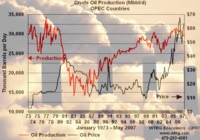Fossil Fuel Production Soars Despite Recession
 EurActiv.com - Fossil fuel producers are dodging the global downturn as production of oil, coal and natural gas reached record levels last year, the Worldwatch Institute said yesterday.
EurActiv.com - Fossil fuel producers are dodging the global downturn as production of oil, coal and natural gas reached record levels last year, the Worldwatch Institute said yesterday. The Washington-based research organisation showed that world fossil fuel production increased by 2.9% in 2008, reaching the highest level ever recorded, 27.4 million tons of oil equivalent (Mtoe) per day. Most of this growth was in the Asia Pacific region, which has been leading for the past decade.
Nevertheless, the worsening economic climate led to a dip in demand during the second half of the year, which was reflected in energy prices, the report said. Oil peaked at $144 per barrel in June when producers were struggling to meet global demand, but dropped to $34 per barrel in December when the market was flooded with excess supply, it explained.
Coal has led production growth for six years now, representing a third of all fossil energy output, the institute reported. This has been buoyed by massive growth in Chinese demand that has left all other countries combined behind, it added.
The continuing dominance of the most polluting fuel in global energy mix has led many countries to look into options such as carbon capture and storage technologies and efficiency gains as a necessary component of climate strategies.
At a UN climate conference in September, Chinese President Hu Jintao pledged that China would reduce its energy intensity to top up the country’s existing 20% commitment for the 2006-10 period. Many developed countries, on the other hand, are hedging their bets on developing CCS, with climate legislation putting a price on CO2 in the EU and similar legislation pending at the US Senate.
“The shift toward gas-fired generation under the EU cap-and-trade system demonstrates how policies that force the externalities of fossil fuel use to be reflected in market prices can reshape energy markets,” the report argued. It added that conservation and improved efficiency are “real options for reducing fossil fuel dependence,” as shown by US legislation aimed at increasing vehicle efficiency by a third over the next seven years.
Natural gas, considered by the industry as a bridging fuel to low-carbon alternatives, retained its 27-28% share of total fossil fuel production last year, according to the Worldwatch Institute. Total production grew by 3.8% in 2008, with high prices spurring exploration in the US in particular, it said.
Countries with ambitious emissions reduction objectives have been increasing their share of natural gas in electricity generation, the organisation said. In the EU, the emissions trading scheme, which obliges industry and power companies to pay for their emissions, has caused the price of coal to exceed that of gas for the first time, it said.
For More Information: EurActivYou can return to the main Market News page, or press the Back button on your browser.

